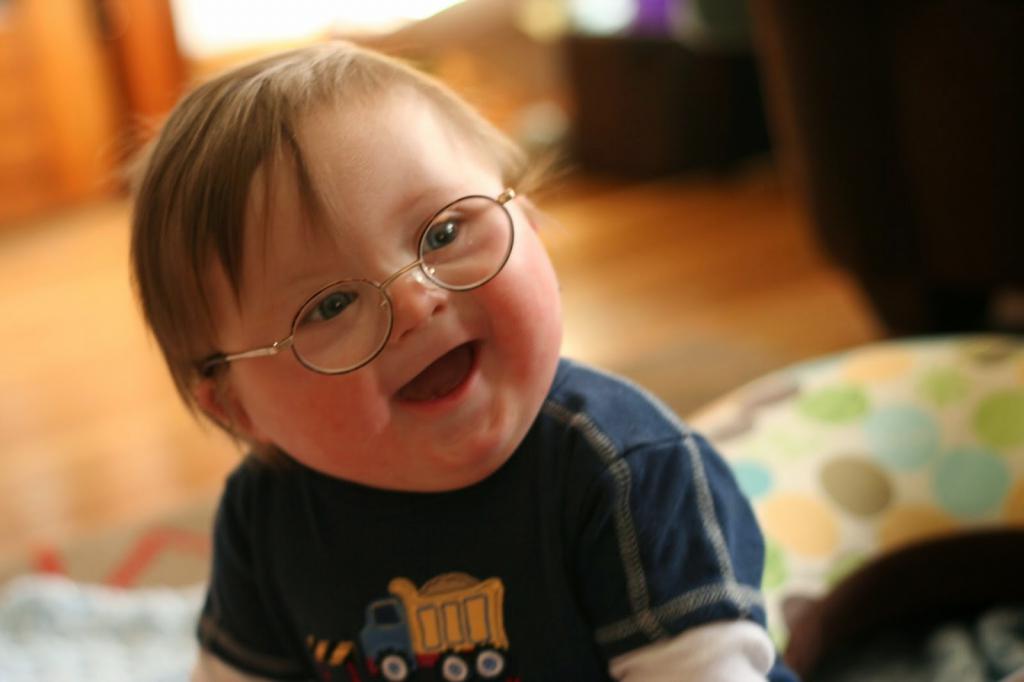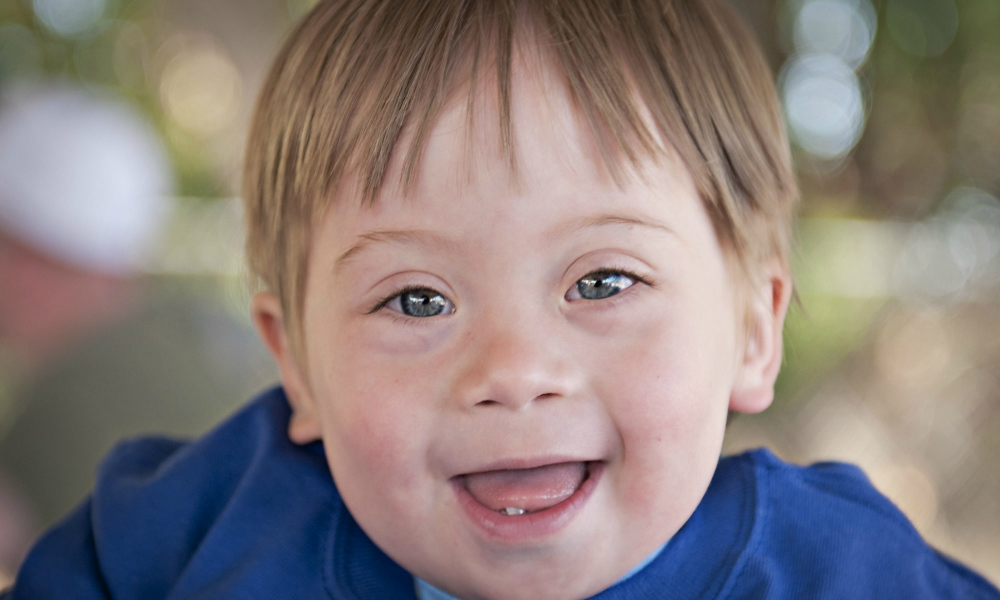“You down!” - how often you can hear such an insult from children's lips. The name of a serious illness that delivers many bitter minutes to everyone it touched gradually flowed into the category of words that could offend and call. However, primarily Down syndrome is a disease. How did it come about? Who was the man who discovered it? And most importantly, what are the causes of Down syndrome?
Who is Down
Although the word "down" is now customary to insult each other, wishing to indicate a lack of mental development, initially Down is a surname. And it belonged to a man in whose honor, in fact, the disease discovered by him was named.
The British scientist John Down was born in Cornwall in the late twenties of the nineteenth century. His surname from his own language translates as “down”, which, in combination with the meaning of the disease discovered by the Englishman (Down syndrome indicates the presence of mental inferiority), looks very funny.

Down had a father as a physician, though a pharmacist, but this does not play a big role. The main thing is that John was familiar with medicine from early childhood and subsequently, of course, he himself entered the corresponding university - already in London. He was acquainted with many outstanding scientists - for example, with Michael Faraday. He worked in a shelter for the insane, gave lectures on medicine, created the first center for working with mentally retarded children. Among his patients, John Down identified a separate category of people with structural features of the skull and tongue. He called them the “Mongolian” group (they belonged to the Mongoloids), and it was by this name that he subsequently determined the name of the congenital disease discovered by him - Mongolism. He described it as a form of mental disorder caused by parental tuberculosis. The name of the scientist was assigned a disease much later, already far after his death - only in the middle of the twentieth century.
The essence of the disease and its history
As just said, a British scientist was able to determine that the disease is congenital. But for a long time, he and many others also believed that it was brought to life by a history of tuberculosis in one or both parents. Later, other theories began to arise. Some believed that the causes of the birth of children with Down syndrome are injuries during delivery. Others believed that everything was to blame for the totality of genetics and heredity. Until the middle of the last century, the exact causes of birth with Down syndrome have not been established. What was reliably known is that a certain connection in the development of the disease exists with the age of the mother. And further - only guesses and assumptions. Of course, people with a similar disease were observed, but it did not bring anything definite. As well as the treatment: the majority of patients, unfortunately, died even in infancy or adolescence.

This continued until the end of the fifties of the twentieth century, when science and technology stepped forward and it became possible to study previously unexplored. It was then that the finest hour of the French scientist Jerome Lejeune came. It was he who was finally able to determine that people suffering from Down syndrome have an extra chromosome - they have forty-seven instead of the required forty-six. A failure occurs on the twenty-first chromosome, in which, instead of two copies, as many as three. That is why Down Syndrome is often called trisomy on the chromosome twenty-one.
Down Syndrome: Causes
So, the thing is clear - the disease appears due to an extra chromosome. But this is only the main cause of Down syndrome. But this extra chromosome itself - where does it come from? Why does someone have forty-six, and someone - one more?
From the school biology course, we remember that meiosis is cell division, when the number of chromosomes decreases exactly by half. But sometimes during meiosis, the chromosomes do not diverge, which is why a gamete is formed, where there are twenty-four chromosomes. We add to it a normal gamete (meaning, with a standard number of chromosomes) - here we get forty-seven chromosomes in total.
As mentioned above, a direct connection between the disease and the age of the mother takes place. The older the woman, the more and more likely to give birth to a baby with developmental disabilities. For comparison: if the future mother’s age does not exceed twenty four to twenty five years, the chance that she will give birth to a sick baby is one in one and a half thousand. If a woman is over thirty, but less than forty, the risk of developing a baby’s disease is one in two hundred. Well, if a young mother is older than forty-five, the likelihood of Down syndrome is one out of twenty. It is believed that the reason for this is the woman's egg cell age.
Not the last role in the causes of Down syndrome is played by the age of the pope. The ability to give birth to a healthy baby is significantly reduced if the future father has crossed the line at forty-two years.
Also among the reasons for the occurrence of Down syndrome during pregnancy can be called the random formation of the necessary germ cells that does not depend on the lifestyle and behavior of future parents. Another reason is a malfunction in the maternal egg. It is impossible to say why it happens, as well as to predict when this will happen and when not.
The cause of Down syndrome disease is also a feature of male sperm. There is no one to blame - it happens. But when parents can be to blame, this is in the case of incest. Marriage between blood relatives is far from the last among the causes of Down syndrome in children. Therefore, love is love, but when marrying some second cousin, a woman should be prepared for the fact that she herself has increased the risk of a sick (or, as they say, special) baby in her family.
The causes of Down syndrome during pregnancy include, of course, the bad habits of parents. Smoking, alcohol abuse and especially drugs: all this can most directly affect the health of the unborn baby. It is worthwhile to think carefully before starting a child if it is difficult or impossible to part with bad habits. After all, an innocent baby should not suffer because of the slovenliness of parents.
Perhaps the last and most significant in the list of causes of Down syndrome is heredity. If someone in the family (even not necessarily the mother or father) has already fought with this ailment, the chance of its recurrence is great. In general, attention should be paid to: a sick child can be born even to the healthiest parents in the world, and the causes of Down syndrome in the fetus in this case will become a mystery to everyone - including doctors. This happens - that’s all that science can say so far.
Types of Down Syndrome
Trisomy is most common, however, another type of the above disease is called mosaicism. In this type of Down syndrome, chromosome nondisjunction does not occur in the formation of germ cells (as in the case of trisomy), but in the embryo cell, at the very early stage of its development. This form of the disease is easier (it is believed that these children are less behind in development than others), but finding it quickly is more difficult. Only five percent of those with Down syndrome suffer from mosaicism.
How often
In previous years, the incidence of the disease was one case per seven hundred people. Today, the possibilities of medicine and technology are more developed, and therefore it has become possible to learn about a child with a disease at an early stage, at the very beginning of pregnancy. Thanks to this, the chance of giving birth to a sick baby has decreased and is now one in a thousand. But the number of abortions has increased - after all, many who find out about the illness of the unborn baby decide to terminate the pregnancy.
By the way, there is an erroneous opinion that the reasons for the birth of children with Down syndrome are skin color or gender of parents. This is not true. Neither race nor gender affiliation affects this disease. The chances of getting both a healthy and a sick baby are absolutely equal for both white and black.
Symptoms of the disease
What is the cause of Down syndrome - a separate issue. But we must finally say about what signs accompany this disease. First of all, this is the so-called flat face. Of course, it is not flat in the literal sense of the word, but if I may say so, flattened. This symptom is found in most patients. On such a face are weakly expressed, both the nose and the eyes and lips do not focus on themselves. The skull itself is often flat (and not only flat, but also short), and there can also be such a bridge.
For the reasons of Down Syndrome, a small (too small) nose, a wide, powerful and short neck, strabismus, disproportionately small in relation to the limb body are found in children. As a rule, in addition to the fact that these children are lagging behind in development, they have a relatively small vocabulary, it is difficult for them to concentrate their attention on one thing for a long time. Such children are also unable to think abstractly due to their illness. They often have very high joint mobility, a congenital heart defect and a wide open mouth are a sign of the disease.
Related diagnoses
By the way, about diseases: these babies are often susceptible to various viruses and infections precisely because of Down syndrome. Weak immunity can not cope with many sores floating in the air. Digestive disorders and interruptions in the thyroid gland, and problems with vision or hearing are not uncommon for patients with Down syndrome.
According to some reports, people with Down syndrome are much less likely to develop cancer, but they are much more likely to suffer from heart ailments, are prone to leukemia, Alzheimer's disease (dementia, or dementia, characteristic of patients over forty), can easily catch pneumonia.
Diagnosis of the disease
Today, it is possible to identify the risk of developing an Down syndrome in an unborn child at the very beginning of pregnancy - even at the first ultrasound, which is usually done at twelve to thirteen weeks. This is called prenatal diagnosis and allows you to see the fetus Down syndrome. No one will tell the causes and signs of the developing disease at the screening, however, the expectant mother will already have information for consideration - how now she should be further. In addition to ultrasound, pregnant women must donate blood. This analysis in percentage terms will show the risk of developing a child's not only Down syndrome, but also other equally dangerous ailments. Blood is also donated in the second trimester - between the sixteenth and eighteenth weeks, and a little later, at five months of pregnancy, a second ultrasound is performed, which eliminates the likelihood of late-onset developmental anomalies. The third ultrasound is done shortly before delivery, from the thirtieth to thirty-fourth weeks.
Is it possible to cure
Unfortunately, since the Down syndrome disease is congenital, genetic, it is not possible to get rid of it. This ailment remains with a person for life. It cannot be said that attempts to fight him have been stopped - doctors are doing everything in their power, but to this day the chances of eliminating the disease are almost zero. This terrifies many people. But at the same time, one should not lose sight of the fact that people with Down syndrome are no more different from ordinary people - they have the same feelings and emotions, the same desires, and their abilities and talents can be even higher than those of their simple peers.
Life prospects
Disease Down syndrome involves not easily mental retardation - in rare cases (this is less than five percent) there is even debility, a little more often (twenty percent of the total) - idiocy. Unfortunately, to teach such children even the simplest things is either almost impossible or incredibly difficult and requires enormous mental expenses. The rest of the children, despite some inferiority, are quite trained. Of course, it is more difficult for them to grasp some things, sometimes they have to devote much more time and attention to them, but all efforts are paid off by their diligence. Of course, it is necessary to deal with such children not according to regular programs, but according to specially developed methods. Perhaps these kids will never become academicians, scientists, professors, but they will undoubtedly learn to walk, talk, perform simple procedures, will be able to take care of themselves and take care of themselves.

Back in the last century, people with Down syndrome lived a very short life. Most often, such people died as infants or as teenagers; only a few survived to adulthood. Now, the life expectancy of such patients has increased and stepped over the mark of half a century: patients with Down syndrome can live with proper care and proper care for over sixty years. According to American studies conducted several years ago, the average life expectancy of these people is approximately forty-nine years. In addition, it was previously believed that men with Down syndrome are unable to have children. According to current data, this is by no means the case. People with such a disease often marry, and the ability to bear children remains in both women and men. By the way, it is not necessary to think that if the parents (or one of them) are sick with Down syndrome, the child will certainly inherit this disease. The likelihood of a healthy baby being born even in such a family is extremely high.
Interesting Facts
To them, after deducting a variety of implausible legends, the following can be attributed.
- The oldest person with Down syndrome lived about one and a half thousand years ago - according to historians.
- In Nazi Germany, as well as in several other countries, children and adults with Down syndrome were killed.
- It is correct to call a disease precisely a “syndrome”, since this word means a combination of any characteristic signs, which is inherent in this disease.
- Twelve years ago, the first international day of a person with Down syndrome was organized and held.
- A large number of children with Down syndrome were born in the winter of nineteen eighty-seventh.
- Down syndrome is a disease that is not unique to humans. Its presence was also detected in mice and monkeys.
- Often, pregnancies with a fetus with Down syndrome result in miscarriages.

- The probability of having a second sick child in healthy parents is less than one percent.
- Children with Down syndrome are often called "sunny" (as, incidentally, adults - but more often babies). These are very kind, open and cheerful people.
- About three to five thousand people are born every year with a disease such as Down syndrome. Most parents (more than eighty percent) refuse such babies even in the maternity hospital.
- There are cases of sick people getting university education.
- Indian scientists believe that the cause of Down syndrome can also be the age of my mother's mother.
- The intelligence of people with Down Syndrome is from twenty to seventy-five. The norm is considered an indicator above seventy.
It doesn’t matter what causes Down syndrome. The main thing is that if you decide to keep your pregnancy and raise this special baby, you should always remember: parental love, care and attention sometimes work wonders. And even a child with Down Syndrome will be able to live an almost full-fledged life if he will firmly feel and know: he is loved and needed.